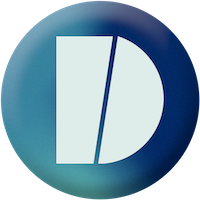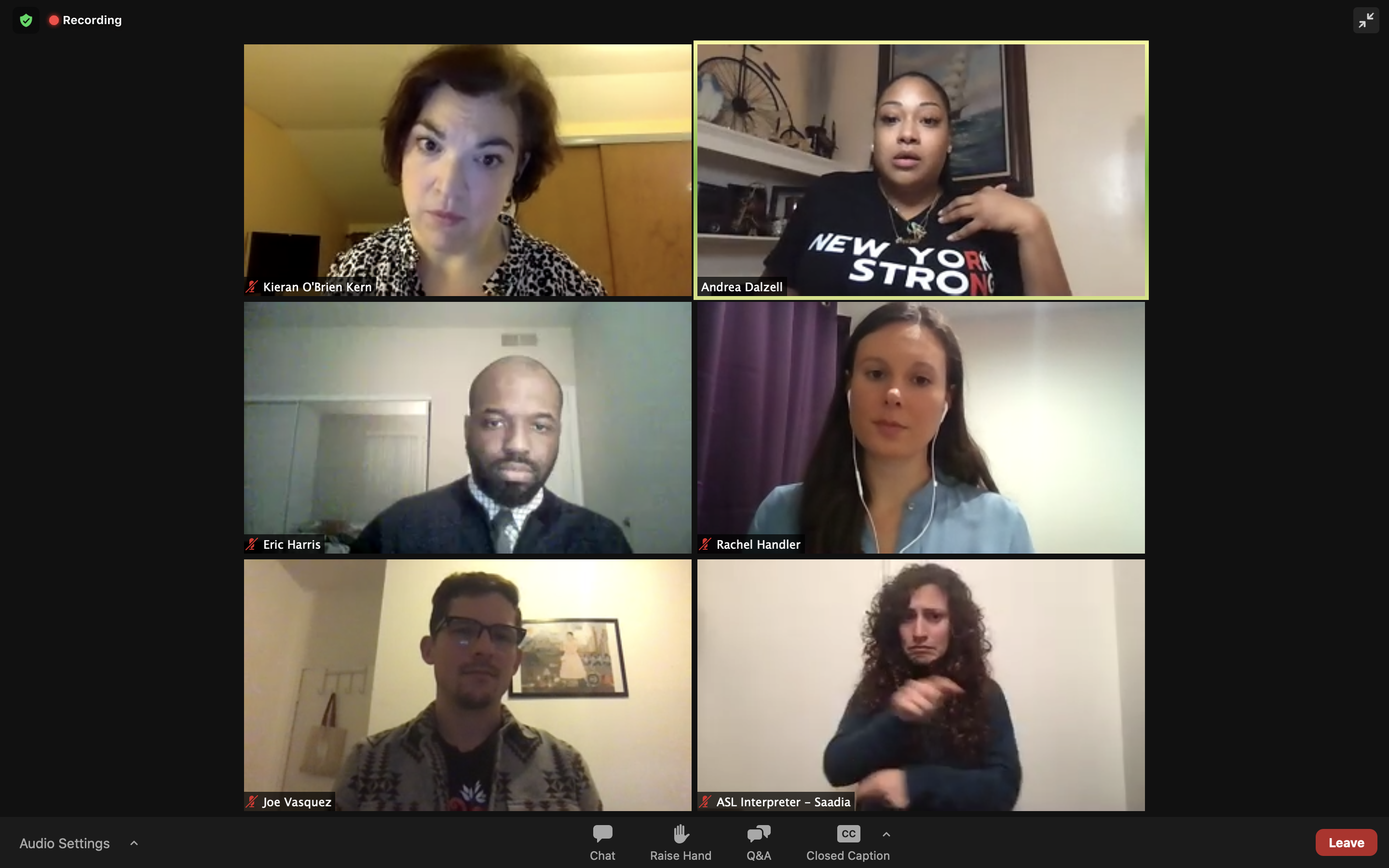The U.S. Bureau of Labor Statistics reported that only 19.3% of disabled people were employed in 2019 compared to the 66.3% of non-disabled people who were employed the same year. Why are so many disabled people unemployed?
On December 1, 2020, Diversability held an online event, “Diversability Unplugged: Workplace Realities” where a panel of distinguished speakers and Diversability community members discussed their experiences on being disabled in the workforce. Panelists included:
- Andrea Dalzell, “The Seated Nurse”
- Eric Harris from Disability Rights California and wheelchair basketball national champion
- Joe Vasquez from Revel Partners and Forbes 30 Under 30 honoree
- Rachel Handler, Actor & Filmmaker
![[Image Description: White text in capital letters on blue background reads, “Diversability Unplugged: Workplace Realities” Smaller text in white capitalized letters reads, “A conversation on disability employment”. Light blue capitalized font reads,”Tuesday, December 1, 7p - 8:15p E.T.” There are four small square headshots of the speakers with their titles underneath their picture. Underneath the headshots is blue text that reads “https://bit.ly/DiversabilityUnplugged”. The white diversability logo is centered at the bottom of the image.]](https://community.thriveglobal.com/wp-content/uploads/2020/12/Copy-of-Team-Diversability-_Great-Attitude_-To-Edit-1.png)
We’ve pulled out some of our favorite quotes from our panelists related to the topics discussed.
Narratives Surrounding Disability
“I went from an all-Deaf school to a traditional public school around the time I had gotten into kindergarten and first grade. I knew immediately I was different. I would hear teachers, friends, and family members say phrases like “deaf and dumb” which was a common phrase that didn’t necessarily mean that someone was dumb because they were deaf. There was just this mainstream phrase that was taken for granted. Every time I heard that, I assumed I was deaf and I was dumb. I think a lot of it was around language even though it wasn’t necessarily intentional. I internalized that a lot. I am very intentional about trying to choose words and use language that is uplifting and empowering for other people. I had to learn that the hard way.” –Joe Vasquez
“When I was a kid growing up, I did not have a disability and I sometimes wonder if I did have a disability if I would have gone into the performing arts just because, disability representation is so few and far between and when we do see people with disabilities in movies, or on TV shows, it’s all represented as bad. Disability is bad. It makes you evil. Or it puts you in the hospital and you never live a life again. Or, you are so inspiring because you can open the door. So we have all of these portrayals of disability that are so inauthentic. I am, in a way, very fortunate that I acquired my disability later (in life). -Rachel Handler
Allyships and Support Systems
“Part of my allyship comes from my family. My brother had to carry my wheelchair up the stairs at every single subway stop that I went to in New York except for the touristy locations of Times Square and some of the other ones where elevators currently work, but in the biggest city in the United States we struggle still with accessibility needs when it comes to public transportation that should be accessibility to everybody. That’s one example, my family, my brother but it extends beyond that.” -Eric Harris
“I didn’t know anybody else who was disabled or who had disabilities. It wasn’t until I got older that I started to become more involved in the disability community and I also started following amazing people on Instagram, social media, and surrounding myself with positive examples of what it looks like to live with a disability and by surrounding myself, I think I lived up to that quote: “You are the average of the five people closest to you.” And by forming that sense of community around me, it naturally reinforced the idea that I am worth it and that ableism doesn’t have to be my dominant mindset or narrative.” -Joe Vasquez
What can organizations do to better accommodate disabled employees?
“(Organizations can be) more intentional about diversifying the workplace with respect to intersectionality, across race, sexual orientation, and disability as well. Being more intentional about that because it really is an asset when you are building your company.” –Joe Vasquez
“(Organizations need) to diversify and include, not just be diverse but figure out a way to include everyone, and making sure they have what they need to not only be present at work but to be able to do the job from wherever they are going to be and allow them that space to flex how their disability is going to be incorporated into that workspace and have an open mind.” -Andrea Dalzell
“People with disabilities should be in HR. People with disabilities should have that level of authority in terms of whether it is HR director or some other level within HR so that that perspective gets brought in every single time an HR decision is being made. It shouldn’t come as some type of a volunteer opportunity like if you have a disability can you please give input. No. They should be hiring people in HR with different disabilities so they can give perspective on what types of disability needs are needed at a given workplace and those people should be able to move up in that space.” -Eric Harris
Advice For Younger Self
“What would I want to share with myself? I think for all those nights where I was faced with deciding if I was a student or deciding if I was a disability rights advocate in my classroom would have been to speak up a little bit more. I did settle a lot. I just allowed other people to dictate what was going to be my future and me falling in line and maybe saying I don’t like this once in a while or pushing back when I really felt that it was unfair but it should have never gotten to being unfair. I should have spoken up right away to the comments behind it saying, “she will never be able to be a nurse, she is never going to be able to do CPR.” (Those comments) laid that self-doubt foundation for myself. I think (speaking up) is extremely pivotal when society is already laying this foundation for us.” -Andrea Dalzell
“I would have told myself first that I am not alone. That there are — at the low end, and of course the statistics aren’t exact, but at the low end, 25% of people have some level of disability and that’s however many choose not to disclose, however many have not been diagnosed with a disability, but that would have been very comforting if I would have known when I was in school and thought I was the only person in my class or school with a disability that there are other students, that there are teachers, maybe the principal. There are other people around me who have lived experience with a disability and that they can relate and I can relate to them.” –Eric Harris
“I would tell myself to not be ashamed to ask for the accommodations that you need especially as an actor, we are last on the totem pole but when we get on set we are just grateful to have a job especially as an actor with a disability. It is like, “thank you for casting me. I am so glad to be here.” We don’t say when the trailer is not accessible or when there is no food we can reach or whatever. Do not be ashamed to ask for what you need. That is your right. You are there as an employee and they should be able to accommodate any accessibility requests you have. That is not being a burden. That is being a human.” -Rachel Handler
Here are some nice parting words from Joe Vasquez to conclude this post about workplace realities as a disabled employee: “If you have the right mindset you can frame your disability in terms of an asset for the organization. It allows you to build products that maybe connect with new markets, it allows you to emphasize with new user segments. Disabilities can be and usually are a huge asset for organizations. It is incumbent upon us to frame our disability in a way that is beneficial for the organization and not just a burden.”
Missed the conversation? Catch the replay on Facebook and YouTube (transcript is linked in the description) and subscribe to our newsletter and join our online community for our next events.


